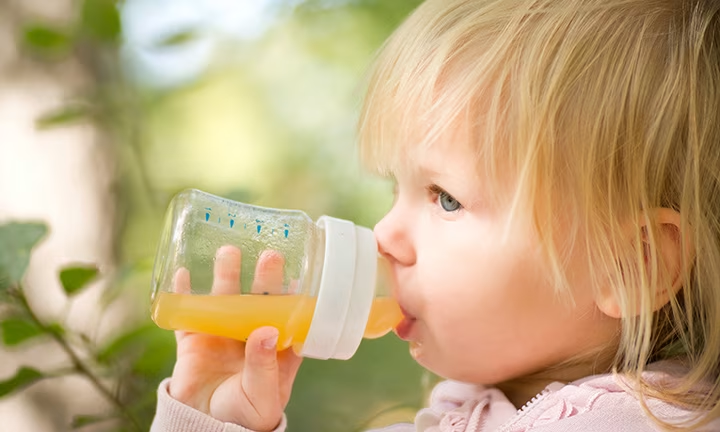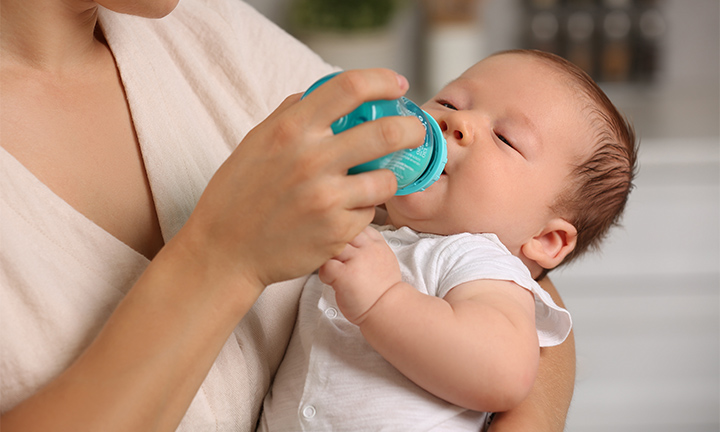
When Can Babies Have Juice and How Much?
Knowing what’s best for their baby is something every parent strives for, and that includes what a baby can eat and drink, and when. If you’re considering giving your baby juice, we’ve got the answers to all your questions. Read on to find out when babies can drink juice and to learn more about your baby's nutritional needs.
When Can Babies Start Drinking Juice?
Many parents ask at what age can babies have juice? The answer is pretty straightforward: juice is not recommended for babies under 1 year as it offers no nutritional benefit. During your baby’s first six months, they get all the fluid and nutrition they need from breast milk or formula, and no additional water or milk is needed.
At 6 months of age, you may start giving your baby additional water in small amounts, on top of the fluids they already receive, but it’s still recommended to avoid juice. It’s not until your baby starts eating solids that they may need extra liquids in their diet. During this period, it’s much healthier for your baby to drink water and eat fruit instead of drinking fruit juice, which unlike fruit has no fiber and can encourage a preference for sweet drinks.
When to Introduce Juice to Your Baby
Whether your baby is 4 months, 6 months, or even 9 months old, it’s not recommended for them to have juice if they are under 12 months of age. One-year-olds can drink juice, such as 100 percent orange or apple juice, but they should have no more than four ounces of juice in a day. Diluting the juice with water will help prevent your baby from consuming too much sugar. A more nutritional option for a baby who is eating solid foods is whole fruit. It contains more fiber and less sugar.
Keeping it simple and healthy is usually the best option. Once your baby is over 6 months, you may offer small amounts of water in addition to breast milk or formula. Here are the daily milk and water intake recommendations for your baby and young child.
Why Your Baby Shouldn’t Drink Juice
As mentioned above, giving juice to your baby under 12 months isn’t advised. For the first six months, breast milk or formula will meet all of your baby's nutritional needs as well as keeping them hydrated. Around the time your baby turns 6 months old, you can start introducing solid foods to their diet and offering small amounts of water.
Even when you've introduced solids, it’s still not necessary to give your baby juice. Here are some reasons juice should be avoided:
Other Drinks to Avoid Giving Your Baby
Besides wondering when to introduce juice to a baby, some parents have questions about specific types of juice, such as when can babies have apple juice or orange juice. The answer is simple: giving your baby juice when they’re younger than 12 months old is not recommended. Here is a full list of drinks to avoid giving your baby, toddler, and child under 5 years:
FAQs at a Glance
Juice does not offer nutritional benefits to babies, toddlers, and young children, so it’s not recommended for your baby under 12 months to drink juice. During your baby’s first six months, they will receive all the liquids they need from breast milk or formula. After 6 months, you may consider giving your little one small amounts of water (4 to 8 ounces per day). Once they’re 12 months or older, giving your baby water or milk is more beneficial than offering juice.
The Bottom Line
Many parents ask the question “When can I give my baby juice?” Giving juice to babies under 12 months isn’t recommended. Drinking juice offers no nutritional benefit for babies and may lead to tooth decay and weight gain; it may even give your child a taste for sweet drinks. Until they reach 6 months, babies get all the fluids they need from breast milk or formula and do not need additional liquids. After 6 months, or when your baby starts eating solid food, you may give them a small amount of additional water to drink as you continue to offer breast milk or formula.
Remember, it’s best to keep it simple when it comes to giving your baby, toddler, and young child something to drink. Stick to water when they are over 6 months, or water and milk once they’re 12 months old.
- American Academy of Pediatrics. Caring for Your Baby and Young Child: Birth to Age 5, 7th ed. (New York: Bantam Books, 2019).
- healthychildren.org. “AAP Recommends No Fruit Juice for Children Under 1 Year.”
- healthychildren.org. “Recommended Drinks for Children Age 5 & Younger.”
- healthychildren.org. “How to Prevent Tooth Decay in Your Baby.”
Read more about Baby
Join a World of Support
through Pregnancy and Parenthood.
TRACK WITH TOOLS
LEARN WITH EXPERTS
GET REWARDED










